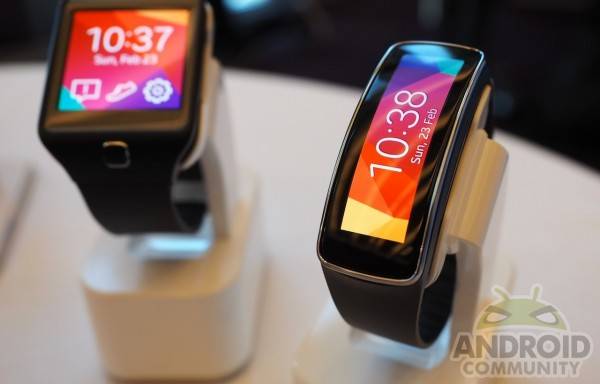
Samsung’s newest wearables are approaching the market from a different angle. Neither of their new Gear smartwatches are Android, instead opting for a Tizen-based system. The Gear Fit, their simple fitness wearable, doesn’t run Android, either. It also doesn’t run Tizen.
Samsung tells CNET their Gear Fit eschews both operating systems for a more proprietary utility. They don’t quite say exactly what OS is powering the device, but note it’s going to be pretty severely locked down. There will be no API or SDK for it, with Samsung instead opting to work with Developers themselves to get apps working on the device.
Essentially, one of two things can happen with the Gear Fit. Samsung can cherry-pick apps they want on the device, or just continue to keep it for their own. Though they say the new non-OS will help battery life reach 3-4 days, the limited utility is concerning. No OS means no app ecosystem, which means it will likely be a Samsung wearable with little to no third party apps coming to it.
The Gear smartwatches already put many off with their limited pairing. Available only to Samsung devices (and a limited lineup at that), the Gear devices remain a frustration for those who may want a Samsung wearable without the Samsung handset. The Gear Fit takes that a step further, with Samsung holding all the cards.
Further pressing the issue is Samsung’s opening up Tizen’s SDK, while the original Gear — an Android wearable — is invite-only for Developers. If you were one looking for the point at which Samsung would draw a line in the sand with Android, wearables may be it.










Clearly you don’t understand what the term OS means. Anything and everything digital has an operating system. The OS is, at the bare bones, a set of instructions. A digital watch has an OS. Not all OSs have a GUI, not all have APIs, but if it’s digitally based it needs a system of instructions to handle I/O.
Semantics? Kind of, but too many people don’t understand this.
Well done! You managed to read the headline and decided to comment without reading the article.
To be semantically correct, bootstrapping a device is not using an OS but simply an IO system so you are incorrect on that point as well.
“Though they say the new non-OS will help battery life reach 3-4 days, the limited utility is concerning. No OS means no app ecosystem, which means it will likely be a Samsung wearable with little to no third party apps coming to it”
I read the article, the use of improper terminology persisted in the content itself.
Even in bootstrapping a device, the kernel contains the set of instructions, which would be the OS. The OS is, as I said, the set of operating instructions which handle any kind of IO
It would really be best to simply say it’s an unnamed, non important OS, or something similar